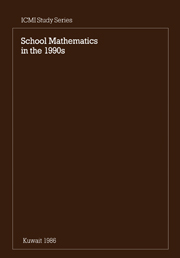Book contents
- Frontmatter
- Contents
- Foreword
- Acknowledgements
- 1 Mathematics in a Technological Society
- 2 Mathematics and General Educational Goals
- 3 The Place and Aims of Mathematics in Schools
- 4 The Content of the School Mathematics Curriculum
- 5 On Particular Content Issues
- 6 Classrooms and Teachers in the 1990s
- 7 Research
- 8 The Processes of Change
- 9 The Way Ahead
- Bibliography
5 - On Particular Content Issues
Published online by Cambridge University Press: 26 April 2011
- Frontmatter
- Contents
- Foreword
- Acknowledgements
- 1 Mathematics in a Technological Society
- 2 Mathematics and General Educational Goals
- 3 The Place and Aims of Mathematics in Schools
- 4 The Content of the School Mathematics Curriculum
- 5 On Particular Content Issues
- 6 Classrooms and Teachers in the 1990s
- 7 Research
- 8 The Processes of Change
- 9 The Way Ahead
- Bibliography
Summary
Any international seminar of the late 1950s or early 1960s would almost certainly have thought about desired curricular innovation in terms of content change: à bas Euclid; away with triangles; sets, relations, functions, linear algebra, and algebraic structure for all, ….
It is, then, perhaps of the greatest significance that at the Kuwait meeting, little, if anything, in the way of new mathematical content was urged (although there was a wish to see certain content, in particular probability and statistics, taught in all countries). Indeed, it was commonly felt that some present content would have to be sacrificed in an attempt to raise the general level of students' understanding and to foster the growth of other types of knowledge than those associated with rote learning.
Changes in the curriculum were viewed, then, more in the form of possible restructurings to reflect better-defined aims and students' learning patterns, than in introducing new content.
Such restructurings will not, however, be quickly accepted. Indeed, much exploratory work would seem to be required before large-scale recommendations can be made. Here it is interesting to note such experiments as that in Brazil where the teacher is expected to allocate 60% of classroom time to covering content which has been centrally stipulated, and 40% to activities which he or she selects from a growing à la carte menu.
- Type
- Chapter
- Information
- School Mathematics in the 1990s , pp. 55 - 74Publisher: Cambridge University PressPrint publication year: 1987



